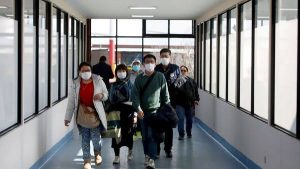Page Contents
What Is a Coronavirus?
Coronaviruses were first identified in the 1960s. The name “coronavirus” is derived from the Latin corona, meaning crown or halo, which refers to the characteristic appearance of the virus particles (virions): they have a fringe reminiscent of a royal crown or of the solar corona.
Coronaviruses are a group of viruses that cause diseases in mammals and birds. In humans, the viruses cause respiratory infections which are typically mild, including the common cold; however, rarer forms such as SARS, MERS and the novel coronavirus causing the current outbreak can be lethal. In cows and pigs, they may cause diarrhea, while in chickens they can cause an upper respiratory disease. There are no vaccines or antiviral drugs that are approved for prevention or treatment.
Coronaviruses are viruses in the subfamily Orthocoronavirinae in the family Coronaviridae, in the order Nidovirales. Coronaviruses are enveloped viruses with a positive-sense single-stranded RNA genome and with a nucleocapsid of helical symmetry. The genomic size of coronaviruses ranges from approximately 26 to 32 kilobases, the largest for an RNA virus.
Coronavirus Symptoms:
The symptoms of most coronaviruses are similar to any other upper respiratory infection, including runny nose, coughing, sore throat, and sometimes a fever. In most cases, you won’t know whether you have a coronavirus or a different cold-causing virus, such as rhinovirus.
Diagnostic Tests:
You could get lab tests, including nose and throat cultures and blood work, to find out whether your cold was caused by a coronavirus, but there’s no reason to. The test results wouldn’t change how you treat your symptoms, which typically go away in a few days.
But if a coronavirus infection spreads to the lower respiratory tract (your windpipe and your lungs), it can cause pneumonia, especially in older people, people with heart disease, or people with weakened immune systems.
Prevention & What to Do About Coronavirus
There is no vaccine for coronavirus. To help prevent a coronavirus infection, do the same things you do to avoid the common cold:
- Wash your hands thoroughly with soap and warm water or with an alcohol-based hand sanitizer.
- Keep your hands and fingers away from your eyes, nose, and mouth.
- Avoid close contact with people who are infected.
You treat a coronavirus infection the same way you treat a cold:
- Get plenty of rest.
- Drink fluids.
- Take over-the-counter medicine for a sore throat and fever. But don’t give aspirin to children or teens younger than 19; use ibuprofen or acetaminophen instead.
Important:
Most coronaviruses spread the same way other cold-causing viruses do: through infected people coughing and sneezing, by touching an infected person’s hands or face, or by touching things such as doorknobs that infected people have touched.
A humidifier or steamy shower can also help ease a sore and scratchy throat.
If you get sick, treat your symptoms and contact a doctor if they get worse or don’t go away.



